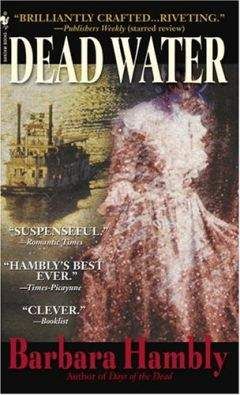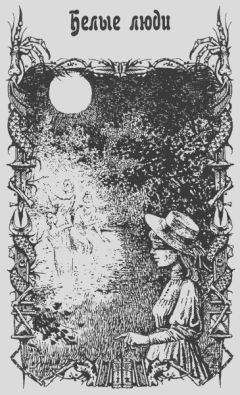Barbara Hambly - Dead water
На сайте mybooks.club вы можете бесплатно читать книги онлайн без регистрации, включая Barbara Hambly - Dead water. Жанр: Прочее издательство неизвестно,. Доступна полная версия книги с кратким содержанием для предварительного ознакомления, аннотацией (предисловием), рецензиями от других читателей и их экспертным мнением.
Кроме того, на сайте mybooks.club вы найдете множество новинок, которые стоит прочитать.

Barbara Hambly - Dead water краткое содержание
Dead water читать онлайн бесплатно
He looked at the bottle, sighed, and turned back into the building.
January emerged from behind his tree and crossed to the shack, sprang up the steps to the door.
As he'd suspected, the saloon was empty.
“Don't tell me you actually drink the liquor this place serves.”
Hannibal was in back of the bar, replacing the bottle behind a loose board in the wall. “Good God, no! I may be a sot, but I'm not a fool. Old Hunks was charging a Santa Fe trapper fifty cents a shot for this on the grounds that it was Scots single-malt.”
He straightened up in the grimy lamplight, resembling a disheveled elf with his long hair straggling out of its old-fashioned pigtail over his back, and his eyebrows standing out dark against his thin white face. “Thou shalt not muzzle the ox that treadeth out the corn. . . . But of course it's just the same bilgewater Hunks dips out of the barrel for a picayune a cup. . . . What are you doing here, amicus meus? If you're seriously looking to get yourself killed, I'll offer you a drink. . . .”
“There are better ways to die,” responded January with an exaggerated shudder.
“And being in this room when the refined clientele returns is one of them,” retorted Hannibal. “Let us retire to my quarters. Nothing amiss with the owl-eyed Athene, I hope?”
And as Hannibal limped over to the shaggy, out-of-fashion beaver hat that stood by his chair to receive whatever contributions his audience cared to give, January grinned at the nickname his friend had given the bespectacled Rose.
“I must say I am cut to the quick to find my art playing second fiddle, as it were, to a bout of not-very-efficient fisticuffs,” Hannibal added as he dumped a few Spanish reales, a British shilling, two American half-dimes, and three eleven-penny bits into his hand. “But at least I can get out of here with all my takings this evening instead of having one of the customers relieve me of them ten feet from the door.”
Small heaps of money lay on the room's single table amid a scattering of cards, and presumably there was a cashbox in the same cache as the so-called “single-malt Scotch.” But these Hannibal ignored as he wrapped his violin in its usual swaddling of faded silk scarves and tucked it into its case.
“If you're getting robbed every night, why do you stay?” January glanced right and left as they emerged from the saloon's rear door, though in the pitch-black night a platoon of club-wielding Kaintucks could have stood within four feet of The Keelboat unseen. Undetected by any other sense as well, for that matter, for the ambient stench of privies would have covered the collective tobacco-reek of the average boatman, and the combined roar of the cicadas and the hollers of the fight still in progress at The Rough and Ready would have masked any sound.
The ground squished under January's boots, and something moved—cat, rat, or gator—in the tangle of hackberry that surrounded the building's rear.
“Old Hunks lets me sleep in one of the cribs.” Hannibal led the way to a sort of long shed that stood behind the saloon, three of its four French doors open into mephitic blackness. The usual inhabitants of the rooms—and their customers—were presumably at the fight as well.
“It's exceedingly generous of him, considering how much he makes per night out of each room. He's from Dublin, and so regards me as a brother. He worked for years as a doorkeeper at the Covent Garden Opera in London. Sometimes after the place closes down for the night, I'll play on for him for hours.”
He opened the door of the fourth crib—none of them had locks—and held January's lantern inside for a moment before entering. Two rats retreated unhurriedly through a crack in the wall. The room was windowless but so rudely put together that in daylight there would have been plenty of light, ventilation, and—to judge by the careful arrangement of old tin pots and broken jars about the floor—almost certainly rain.
“Besides,” the fiddler went on, flicking a roach the size of a small mouse from the candle-holder and angling the candle to the lantern's flame, “I defy you to name an establishment in town this summer where you wouldn't be robbed. Everything respectable has closed down. Even the folks out in Milneburgh aren't holding many cotillions this year.”
January, settling himself on the goods-box that held most of Hannibal's books, had to agree. In former years, summers had been slow times, but every week or so there would be some banker or sugar-broker or town rentier hosting a ball in one of the big hotels by the lake. This year so far they had been few.
“You're lucky that you haven't had to rely on your music this year to butter your bread.” Hannibal produced from another goods-box a small bottle of sherry and a square black one of laudanum. He measured a tiny amount of the one and a tinier dose of the other into a tin cup and drank it down. “In honored poverty thy voice did weave / Songs consecrate to truth and liberty . . .” After a moment's thought he took another fast sip of the laudanum alone, then stoppered both bottles and put them away. “What's happened? And how can I help?”
“I'm glad you asked.” January outlined for him what Hubert Granville had said about the absconding manager of the Bank of Louisiana, and about the need for secrecy that precluded enlisting the City Guards until hard evidence was secured.
“What I need,” said January, “is a master aboard the Silver Moon. A free black man traveling by himself draws comment. A slave is invisible, and I need to be invisible. In some circumstances a slave is safer than a free black man,” he added with a bitterness that had turned to irony over the years. “At least someone's going to complain if a slave disappears. And having a white man along to deal with the local authorities when we do find which trunks contain the money will be a help, too. Granville's paying us five hundred dollars.”
“In Bank of Louisiana notes?”
January laughed curtly. “Dryden says that when a man takes a wife and fathers children, he gives hostages to fortune. Disaster falls, not only on his head alone, but on the heads of those he loves. Rose and I have the chance to be something, to have something, to make something, rather than scraping along on what I can earn playing the piano for quadroon balls and what she gets translating Greek texts for booksellers. You can't go on all your life that way. It does something to you, as time wears on.”
He stopped, looking around the seedy darkness of the room, with weeds growing up through the cracks in the board floor and roaches spotting the wall behind the candle flame. Looking at Hannibal's face, thin with a lifetime of illness and pain, and at the long, sensitive hands in the frayed cuffs.
The fiddler's grin was wry under his graying mustache. “To save you and Athene from the life I daily live, amicus meus, I will gladly play the despot and spend my days in the company of tobacco-spitting Americans in a steamboat saloon—particularly at the Bank of Louisiana's expense. I think I have a shirt in here somewhere that will not violate the personation of a man with enough money to own a slave.”
On the other side of the thin partition wall, January heard a man curse in English, followed by a woman's protesting drawl, “Just gimme a minute. . . .” Bedropes creaked mightily.
“The fight must be over,” January opined.
A huge and comprehensively drunk boatman loomed suddenly in the doorway. “Look out, beautiful, 'cause here comes the very child that coined the name of Thunder! Cock-a-doodle-do!” He let fall his trousers, at which Hannibal promptly began to applaud.
The boatman retreated in confusion.
“Happens every week,” sighed the fiddler, pulling his valise from under the bed. “I've tried chalking NO GIRLS HERE on the door, but that doesn't seem to work either . . . and it doesn't help that occasionally one of the girls will entertain a customer here while I'm playing up front. . . .”
Shouts of laughter outside. “You done already, Kyle? I got me a pet jack-rabbit takes more time than that!”
“A man can live in this fashion for a time.” Hannibal sighed, fishing in yet another goods-box for his few shirts of threadbare linen. “A long time, in my case. And a strong woman can endure it for a few years. But as the playwright says, Money is the sinews of love, as of war. Poverty can break a marriage, and I love you and Rose too much to want to see you turn on each other, as the poor so often do, and your happiness vanish for want of hope.”
He tossed in his shaving tackle and three half-empty bottles of opium and sherry. “So it remains only to arm myself, like Prince Achilles before the walls of Troy. The silver cuishes first his thighs infold; Then o'er his breast was braced the hollow gold. . . .”
Hannibal held up a much-frayed and slightly too large silk waistcoat, which must have been expensive when it was new, with a triple-notched collar some twenty years out of style. “The brazen sword a various baldric tied / That, starred with gems, hung glittering at his side. . . . Should I bring along a brazen sword, amicus meus?” He snapped shut his valise. “Or the great paternal spear the poet speaks of? How dangerous is Weems?”
“I have no idea.” January pinched out the candle, which Hannibal slipped into his pocket as the two men stood listening beside the door, waiting for the customers at the other cribs to go inside. “Nor who his accomplices are, if he has any, or how many of them there are.”
The flimsy walls shuddered with the slamming of a door. A woman's voice purred, “Well, hello, handsome,” from the next room, and January and Hannibal stepped out into the muggy heat of the June night.
Hannibal pulled shut the door behind him, and gestured extravagantly with his free hand.
“So let it be!
Portents and prodigies are lost on me.
I know my fate: to die, to see no more
My much-loved parents and my native shore—
Enough—when Heaven ordains, I sink in night:
“Now perish Troy!” he said, and rushed to fight.”
Even in summer's doldrums, the levee at New Orleans never really slept. In winter, when boats came down-river with their decks stacked so deep in cotton that it blacked out the windows of the engine-room on the main deck and the staterooms above, they'd be lined up three and four deep at the wharves, so that passengers would have to walk across the sterns of several other boats to get to shore, and the shifting of barrels, hogsheads, bales, and crates would go on all night. In summer, when the river sagged twenty feet below its high-water mark and the big side-wheelers lay in their berths, goods still arrived from Europe and New York. Planters up-river still demanded delivery on bolts of silk and crates of crystal goblets packed in straw, and passengers still journeyed in the smaller stern-wheelers, which could travel where and when the larger craft could not.
By the glare of armloads of wood burning aloft in iron cressets, January watched stevedores heave the last of the luggage on board, and stack cords of logs for the ever-hungry furnaces. Soot from the tall chimney stacks gushed into the sullen sky above the levee. Now and then showers of sparks would whirl upward, only the height of the stacks preventing them from igniting the boats themselves. On the deck of the Silver Moon a nervous little gentleman with a pot belly and octagonal spectacles fussily marshalled the deck-hands—the owner, January guessed. Beside him, a tall, slim young man in a steward's white coat read from a notebook and called out to the porters: “Leave that trunk on the deck, Mr. Purlie gettin' off at Donaldsonville. Those go in the hold, Colonel Davis goin' on with us to Memphis this time. . . .”
January shifted Hannibal's valise, and his own small satchel, in his hand.
“All the way through to Memphis,” requested Hannibal of the clerk at the steamboat office window. The man took the Bank of Louisiana notes without question. January had to admit he'd been holding his breath.
“Hell, don't you piss around sellin' your niggers here and there along the river,” boomed a voice near-by. “Niggers are sky-high in St. Louis, fourteen hundred, fifteen hundred for prime bucks. . . .”
January turned and saw the speaker, bow-legged and broad-shouldered, his shortness making him look like an animate barrel, with tobacco-stains in his yellow mustache and a mouth like the hack of an ax. He jabbed a finger at another man, then gestured back to the line behind him: five men, four women, linked together by hanks of chain.
Scared, some of them, looking around in the sickly yellow of the smoke-fouled dawn. In Virginia and Kentucky, January knew, sluggards and troublemakers were threatened by their masters with being “sold down the river” to the cane plantations—and, he reflected, remembering his own childhood, they were right to fear. Three of the men clutched little bundles of clothing done up in bandannas, all they'd been able to carry from Baltimore, Charleston, Savannah, still seasick from the voyage and aching with grief for friends and family they'd never see again. One woman clutched a small child to her side. Another, a girl with the fair-skinned quadroon beauty prized by so many white men, stared at the slave-dealer with naked hatred in her eyes.
“They got more and more land goin' for cotton up there, and they'll pay damn near anythin' for hands to work it. You can't go wrong with St. Louis, or my name ain't Ned Gleet!”
January turned away, sick with the sickness of helplessness, rage, and disgust, and looked around for Rose. He glimpsed her between the brick arches of the market buildings that stretched along the levee downstream of the Place des Armes, nearly out of sight in the shadows. She was dressed like the market-women who were just beginning to make their appearance, with their baskets of roses and oranges: a short red skirt and a petticoat of blue-and-orange calico, a white blouse and a short red corduroy jacket, a gay bandanna hiding her hair. With her spectacles she looked like an intellectual gypsy. With a glance back at Hannibal, who was still chatting with the clerk, January crossed to her, and as he drew close he saw Hubert Granville half-concealed behind the pillar, looking out into the square.
“That's Weems.” Granville pointed, and January turned to see a small, dapper gentleman in a full-skirted coat of rust-colored wool and a very unfortunate silk waistcoat of purple and mustard. The bank manager was arguing about something with the pot-bellied owner. The slender steward intervened, consulting his notebook, pointing up at the staterooms that ranged both sides of the upper, or boiler, deck. “Here's the sample of his handwriting you asked for,” Granville told January.
January pocketed the folded note the banker offered him, to compare against the labels of every trunk and box in the hold, if and when he could manage to sneak down there. That this would be difficult, he guessed—that sleek, efficient young steward might prove to be either venal or careless or both, but somehow January doubted it. Nor would he know until he was on board how many ways there were into the cargo-hold, and whose work-stations overlooked them. Through hard experience he had learned that trying to plan ahead without information led only to madness, especially in a situation with so many tiny variables.
Похожие книги на "Dead water", Barbara Hambly
Barbara Hambly читать все книги автора по порядку
Barbara Hambly - все книги автора в одном месте читать по порядку полные версии на сайте онлайн библиотеки mybooks.club.




